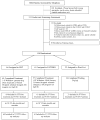Remediating organizational functioning in children with ADHD: immediate and long-term effects from a randomized controlled trial
- PMID: 22889336
- PMCID: PMC3549033
- DOI: 10.1037/a0029648
Remediating organizational functioning in children with ADHD: immediate and long-term effects from a randomized controlled trial
Abstract
Objective: The study compared the efficacy of 2 behavioral interventions to ameliorate organization, time management, and planning (OTMP) difficulties in 3rd- to 5th-grade children with attention-deficit/hyperactivity disorder (ADHD).
Method: In a dual-site randomized controlled trial, 158 children were assigned to organizational skills training (OST; N = 64); PATHKO, a performance-based intervention that precluded skills training (N = 61); or a wait-list control (WL, N = 33). Treatments were 20 individual clinic-based sessions over 10-12 weeks. OST involved skills building provided primarily to the child. PATHKO trained parents and teachers to reinforce children contingently for meeting end-point target goals. Primary outcomes were the Children's Organizational Skills Scales (COSS-Parent, COSS-Teacher). Other relevant functional outcomes were assessed. Percentage of participants no longer meeting inclusion criteria for OTMP impairments informed on clinical significance. Assessments occurred at post-treatment, 1-month post-treatment, and twice in the following school year.
Results: OST was superior to WL on the COSS-P (Cohen's d = 2.77; p < .0001), COSS-T (d = 1.18; p < .0001), children's COSS self-ratings, academic performance and proficiency, homework, and family functioning. OST was significantly better than PATHKO only on the COSS-P (d = 0.63; p < .005). PATHKO was superior to WL on most outcomes but not on academic proficiency. Sixty percent of OST and PATHKO participants versus 3% of controls no longer met OTMP inclusion criteria. Significant maintenance effects were found for both treatments.
Conclusions: Two distinct treatments targeting OTMP problems in children with ADHD generated robust, sustained functional improvements. The interventions show promise of clinical utility in children with ADHD and organizational deficits.
References
-
- Abikoff HA, Gallagher R. Assessment and remediation of organizational skills deficits in children with ADHD. In: McBurnett K, Pfiffner L, editors. Attention Deficit Hyperactivity Disorder: Concepts, controversies, new directions. New York, NY: Information Healthcare USA; 2008. pp. 137–152.
-
- Abikoff H, Gallagher R. Technical Manual. North Tonawanda, NY: Multihealth Systems, Inc; 2009. The Children's Organizational Skills Scales.
-
- Abikoff H, Gallagher R, Alvir J. A teacher rating scale of children’s organizational, time management and planning skills: The COSS-T. Poster session presented at the Annual Meeting of the International Society for Research in Child and Adolescent Psychopathology; Sydney, Australia. 2003. Jun,
Publication types
MeSH terms
Grants and funding
LinkOut - more resources
Full Text Sources
Other Literature Sources
Medical
Miscellaneous


